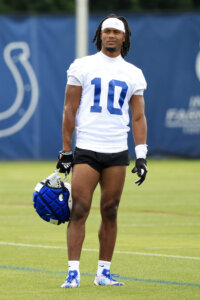The NFL rookie with the name Jews cannot say aloud. (Or can they?)
Adonai Mitchell might start for the Indianapolis Colts. What’s a Jewish fan to do?

Colts fans hope Adonai Mitchell (left) is the, uh, answer to their prayers at wide receiver. Photo by Jonathan Bachman/Getty Images
Thou shalt not take the Lord’s name in vain, the Ten Commandments tell us. But what if the Lord’s name is lining up at wide receiver?
It’s a conundrum Jewish football fans could face this year: The Indianapolis Colts signed a contract on Thursday with a rookie named Adonai Mitchell.
Adonai is a Hebrew name for God that Jews use during worship; halacha, or Jewish law, forbids its use outside of ritual contexts. (Hashem, which means “the name,” is generally substituted.) So what do you say when Adonai catches a pass — or drops one?
Fortunately, Mitchell gave the world a fallback option: his nickname, “AD.”
That’s one way Judah Fortgang, an Orthodox Jew who writes and podcasts about the NFL for Pro Football Focus, might handle the situation. More likely, Fortgang told me, he’ll just refer to Mitchell by his last name, which is in any case common with professional athletes: One other active pass-catcher shares that surname — the Lions’ James Mitchell — but he rarely plays.
Adonai Mitchell, on the other hand, is a highly touted prospect who won two NCAA championships before Indianapolis drafted him in the second round (52nd pick overall). ESPN ranks him third on the Colts’ depth chart at wide receiver.

Jori Epstein, an observant Jew who works as a senior reporter for Yahoo! Sports, pointed out that Mitchell pronounces his name “ADD–en-eye,” which is different from how God’s name is recited in Hebrew prayers (ah-do-NAI).
“Still,” said Epstein, “it’s close enough to be uncomfortable.” So when Mitchell comes up in work conversation, she uses A.D.. When he comes up in her cousins’ group chat — they keep a list of NFL players with biblical names, like Ezekiel Elliot and Nahshon Wright — she calls Mitchell “Ado-shem,” a halachically safe portmanteau.
Were she to interview Mitchell, she’d start by bringing this all up.
“I love having those opportunities,” she said. “As a reporter, a lot of the job is building relationships, and if we don’t give anything on the reporter end, people are less likely to feel comfortable and trusting and willing to open up.”
But the name might not be much of an issue after all.
I reached out to Rabbi Avi Schwartz, an NFL fan who works at Rutgers University Hillel, to get some guidance. Turned out Schwartz had already consulted his own rabbi, Aryeh Lebowitz, a leader at Yeshiva University’s seminary — who had recently asked his rabbi, YU’s Rabbi Hershel Schachter, about someone who worked with a doctor whose name sounded like the Hebrew word for God.
Schachter, who is perhaps the leading posek, or halachic adviser, for Orthodox Jews in the United States, did not appear to see it as much of a dilemma.
“He thought that it’s fine,” Lebowitz said in a voice note Schwartz forwarded. The rationale, Schwartz said, was that “it’s obvious that you’re not calling” a wide receiver “as your god.” It is permissible, he explained, to use adonai or another Hebrew word for God, elohim, when referring to gods of other religions.
Even in light of Schachter’s ruling, Epstein said the exercise in caution had been a rewarding one. And if an Indianapolis Colts draft pick can get people to think more before they speak, she said, “he probably deserves early consideration as rookie of the year.”





















